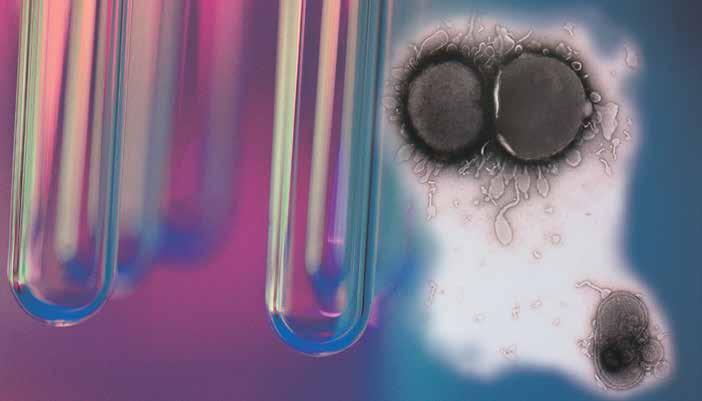
4 minute read
Lifesaving research
The Spencer Dayman Research Fund commenced the year with an exciting portfolio of projects covering prevention, diagnosis and treatment. This included the prospect of three new major research projects totalling £633,371. Unfortunately, the significant financial impact of the Covid-19 pandemic meant that we had to make significant changes to our plans. Above all, we took the difficult decision to withdraw full funding (£186k) from the following pneumococcal vaccine project: • Developing a multivalent Streptococcus pneumoniae recombinant glycoconjugate vaccine for preventing meningitis, led by Professors Jeremy Brown and Brendan Wren at University
College London Thankfully, this project had not commenced at the time this decision was made. We continue to work with the research team to help secure funding to deliver this important piece of work, which, if it can go ahead, will help to develop a vaccine that provides better protection against pneumococcal meningitis. And after much close liaison with the lead researcher, we were delighted to be able to offer part-funding totalling £58k to the following project, which aims to increase understanding of tuberculous meningitis (TBM) in children leading to improved diagnostic tests and outcomes: • SURE + DP: Improving diagnosis and prognosis for paediatric tuberculous meningitis through the SURE treatment trial, led by Professor Robin Basu Roy at University College London
Clinical Trials Unit
Over 30 months, this revised project will recruit a ‘non-TBM’ control group of children alongside the SURE treatment trial in Africa. A small amount of additional funding will allow for pilot analysis of samples, the results of which will help to secure the additional funding needed for the full analysis proposed in the original grant application. We look forward to this revised project starting early next year.
Progress on the delivery of our two ongoing research projects was delayed by the Covid-19 pandemic with many laboratories and study sites subject to closure, restricted in terms of the volume of work they were able to conduct, and/or required to prioritise Covid-related research.
Nonetheless, we were delighted to see progress in both projects, and to see the valuable contribution made by these and other laboratories to the fight against Covid-19.
• Improve treatment outcomes in tuberculous meningitis (TBM), led by Professor Robert
Wilkinson at Imperial College London and the Francis Crick Institute
Progress on this three-year project, which started in January 2020, was disrupted for many months, most noticeably by the collection of samples from patients taking part in a large clinical trial for TBM treatment in South Africa. Despite delays, the team has made significant progress in year 1 and sample collection in South Africa has now recommenced. In addition, experiments to develop a new model to test treatments for TBM are progressing well.
• Creation of sample collection from ‘Be on the TEAM’ study throat swabs for molecular (PCR) analysis of meningococcal carriage and carriage density, led by Professor Adam Finn at the
Spencer Dayman Research Laboratories, University of Bristol
This two-year project started in 2019 and is generously funded by The Starfish Trust and a Life for a Cure. The project ensures the collation and storage of throat swab samples from the national ‘Be on the TEAM’ study, which aims to understand if immunising teenagers with a MenB vaccine could reduce the risk of others getting meningitis across the whole community. This study, which is led by the University of Oxford, had successfully recruited the 24,000 teenagers required to fulfil its stated aims. Meningitis Now had actively contributed to this work by providing prize-draw incentives to encourage participation and by providing volunteers and Ambassadors at study sites. Sadly, the study was brought to a premature end as a result of the disruption of Covid-19, but thanks to the storage of the swabs and culture samples at the Spencer Dayman Meningitis Laboratories at the University of Bristol, it is hoped that additional funds from the National Institute of Health Research can support additional PCR analysis of these samples in order to realise the study’s original aims.
We are also pleased to learn that some initial analysis of the swabs shows the positive effect that the MenACWY vaccine has on the carriage of, and impact on, MenW and MenY in teenagers – and we await the publication of this and other studies. The swabs were also put to good use in the early stages of the Covid-19 pandemic, when the presence of the virus was detected via PCR analysis of the samples collected in February and March 2020.
In December we received a final report from the following project:
• Babies born Early Antibody Response to Men B vaccination (BEAR Men B), led by
Professor Paul Heath at St George’s, University of London
The research team successfully demonstrated that, overall, the MenB (Bexsero) vaccine can safely protect premature babies in the UK. This includes very premature babies. This is great news and the results will provide a positive impact by informing future vaccination of preterm babies. This work was partially funded by us, with the balance of funding provided by GSK.








